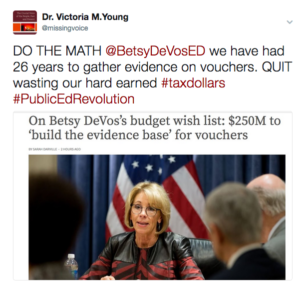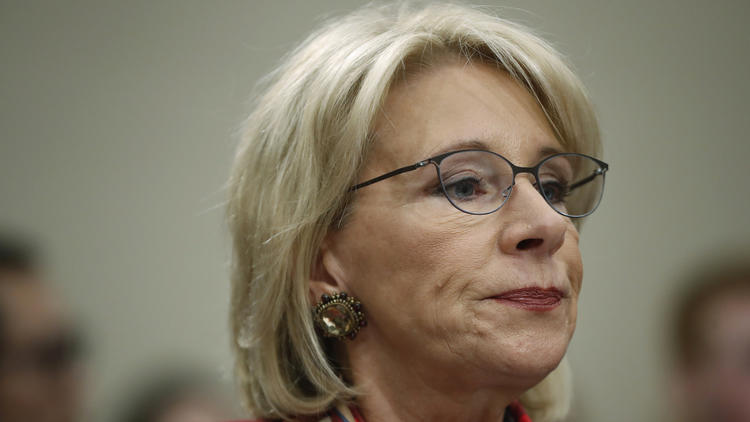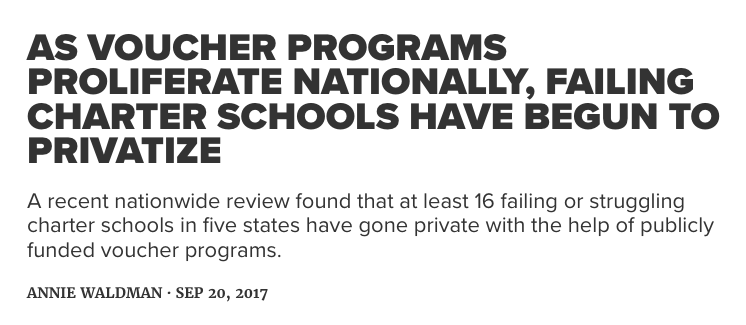The concept behind Voucher Funding is being stated simply as “Money Follows the Student.” But that is a phrase — like “No Child Left Behind” — that carries with it an instant emotional appeal and creates a barrier to debate.
Think about it. Who will openly object to not leaving children behind? Why would anyone disagree with the idea that funding should focus on students? It should, but it should do so without causing harm.
Using Language to Produce Political Conformity
Across the nation funding formulas are being called “out dated” or “antiquated.” Lawmakers and taxpayers are being sold on “new” and “innovative” ideas. Sound familiar?
“School Choice” has appeal. …
“People like the idea of choice,” says Reverend Barry Lynn, executive director of Americans United for Separation of Church and State.
But …
Americans hold firm against allowing public tax dollars to fund private schools. Source: Vouchers, School Privatization, and the Threat to Public Education
Americans do want to increase funding for public schools. But public tax dollars are inadvertently being used for privatization purposes through new modernized funding formulas.
“Money Follows the Student” masks the fact that enrollment based student centered funding formulas are a Voucher Funding scheme.


This is what U.S. Education Secretary Betsy DeVos has to say about the public system she openly defames while traveling the country to promote her Federal School Choice Agenda.
And now, the language of political conformity is being used to promote Voucher Funding by coupling the words “funding follows the child” with the concept of education as a “public good.” Linked together, those truisms are used to justify public funds being used to pay for personal choices in a “school choice” system dominated by private service providers — the education marketplace — both private schools and privately run charter schools.
“Secretary DeVos has always said education is an investment in students, not in schools or school systems,… and public education is any education that serves the public.” Elizabeth Hill, Secretary, DeVos’ spokeswoman
But is the idea of all education serving the public mean that the taxpaying public should pay for all personal choices when it comes to providing a free “public” education?
The foundation for the charter and voucher “school choice” theory of improving education is competition. Charter schools and voucher programs were to spur competition that would lead to all schools improving themselves —thus it would be best for all students.
… when parents can choose where to send their child to school, they will choose the highest performing options. And flexibility, supporters argue, fosters the best environment for market competition and cost efficiency.
Those arguing against charter expansion and voucher programs point to what they see happen to existing schools and the effects on the broader population of students that those schools serve.
… shifting a handful of students from a public school into private schools will not decrease what the public school must pay for teachers and facilities — but funding for those costs will decrease as students leave.
 With Wisconsin beginning their voucher experiment in 1989, we now have 30 years of data collected. If proponents of a Voucher Funding System are seeing great success, why aren’t they spreading their cost/benefit findings as far and wide as they seem to be doing with their slogans — “funding follows the child” — “money follows the student”?
With Wisconsin beginning their voucher experiment in 1989, we now have 30 years of data collected. If proponents of a Voucher Funding System are seeing great success, why aren’t they spreading their cost/benefit findings as far and wide as they seem to be doing with their slogans — “funding follows the child” — “money follows the student”?

Officially 30 years since passage of the law. This response is from 2017 and I was giving her the benefit of the doubt on the first couple of years of implementation.
The Need to Follow the Money
A weighted-student formula based on enrollment is another way of saying “money follows the student.” It is a voucher funding system that is fracturing the public school’s system. Simply (?) following the money in a publicly funded, privately controlled charter/voucher system is difficult to impossible for the average citizen.
Truly accounting for taxpayer funds? … Well, good luck!
Researchers have increasingly explored the subconscious link between money and corruption — called behavioral ethicality — to find out why even morally conscious people are able to cause harm to others.
We know that money has corrupted our politics but to think money has the power to corrupt anyone’s decision-making is hard to fathom. So for that reason, we need education policies that do not provide perverse incentives to game the system. Determining the monetary value of each student, putting that student into a marketplace and subjecting them to advertising pressures is creating exactly the wrong incentives.
Funding Matters
“We have a problem where public money is siphoned off from the public schools and given to children who are going to charter and private schools.” —Oklahoma Teacher of the Year Jon Hazell
Hazell said he told DeVos how funding for charter schools and private school vouchers had further strained his state’s education budget — which has seen some of the nation’s most dramatic cuts over the last decade.
He said he has watched those budgets shrink from year to year, and though his community has been shielded from the cuts thanks to a wealthy local tax base, his colleagues in virtually every other part of the state face incredible challenges.

The nation’s top teachers met with Betsy DeVos, and were not thrilled with what she had to say. – (Sec. Betsy DeVos waits to testify to a House Committee on Appropriation on Capitol Hill in Washington, March 20, 2018. Pablo Martinez Monsivais / AP)
At Risk
Looking to the future, are we willing to continue on this path knowing that following the money in a “Money Follows the Student” funding system will only get harder?
While it’s widely known that private schools convert to charter status to take advantage of public dollars, more schools are now heading in the opposite direction. As voucher programs across the country proliferate, shuttered charter schools, like the [failed] Orange Park Performing Arts Academy, have begun to privatize in order to stay open with state assistance [vouchers].
 It’s also widely known that as for-profit charters became widely criticized, for-profit organizations changed to non-profit status.
It’s also widely known that as for-profit charters became widely criticized, for-profit organizations changed to non-profit status.


Pingback: Independence Day: Why the Republic Requires Rebellion | The Crucial Voice of the PeopleThe Crucial Voice of the People